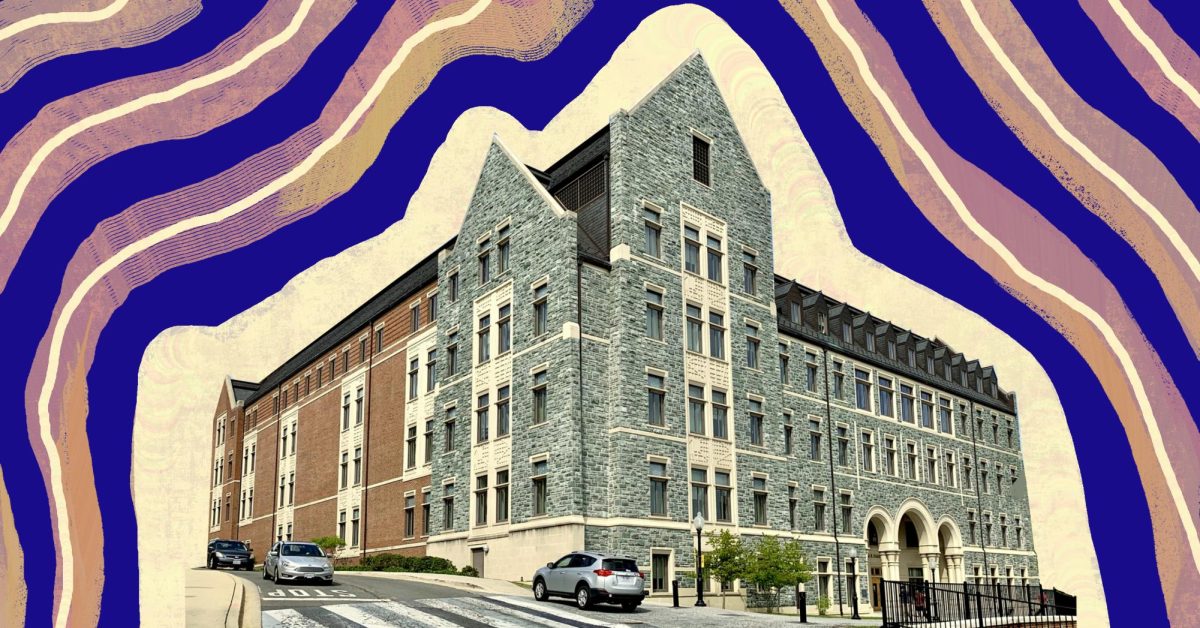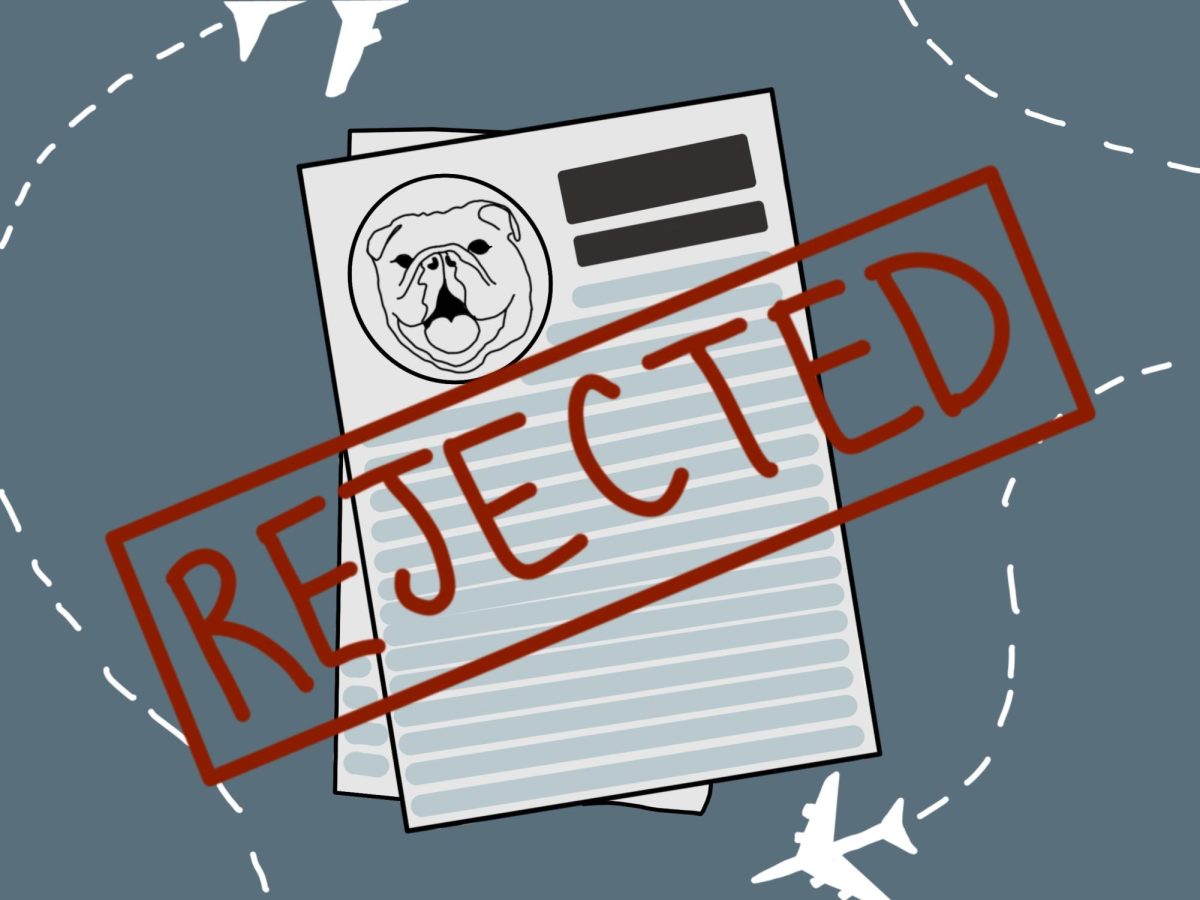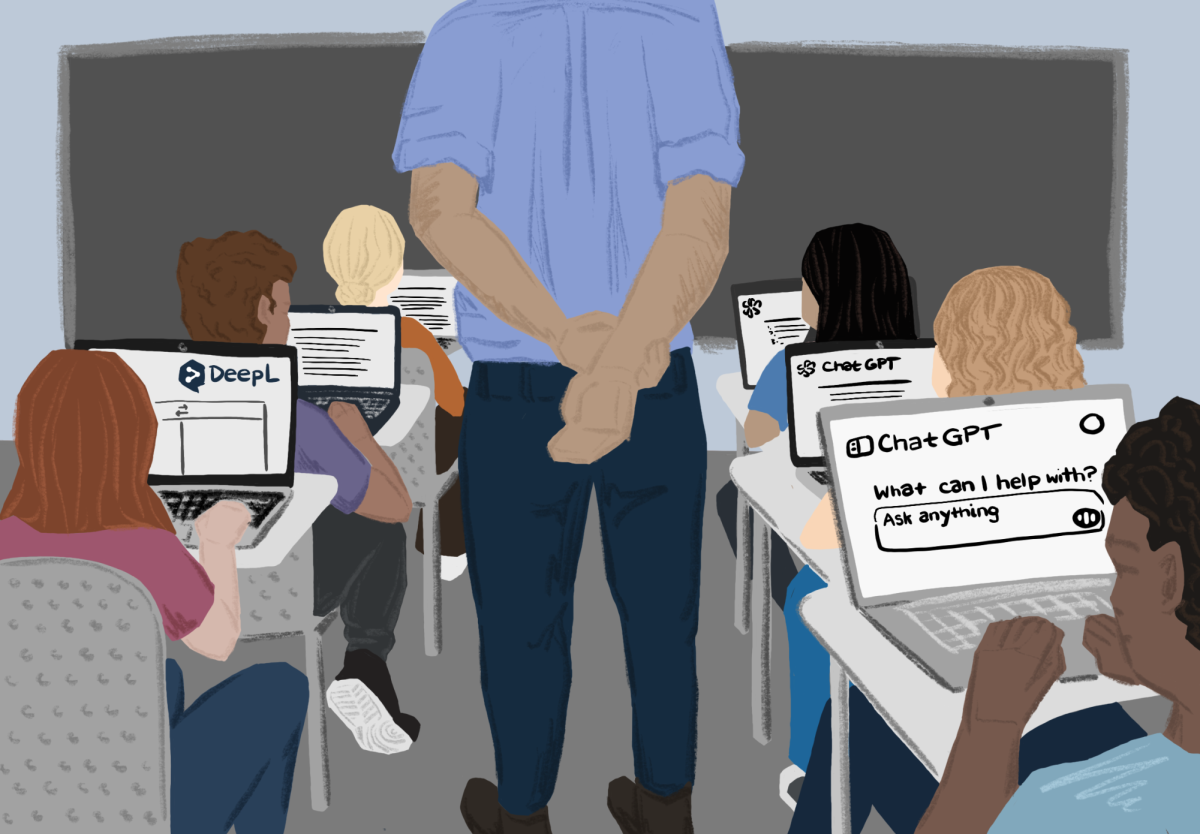When Brittany Lovely (LAW ’26) became pregnant during her first year at Georgetown University Law Center (GULC), she never expected to make national media.
Yet after the law school delayed responding to and then denied her request for accommodations that would enable her to take her final exams before her baby’s birth, Lovely found herself amid an unexpected legal battle as she and her friends spread petitions, wrote legal memos and all but went to court to advocate for equitable accommodations.
“It felt like a very ironic situation where now I have to spend a lot of my time fighting with the school that I’m building a community in,” Lovely told The Hoya.
According to university policy and federal law, pregnant students can request accommodations such as rescheduling tests or exams, so long as the adjustments do not “fundamentally alter the course of study or program.” Yet GULC denied Lovely’s request for early exams and suggested she instead drop the class or take the test on its set date with extended time to breastfeed.
A university spokesperson said that Georgetown has final discretion over accommodations, as per federal law.
“Legally, while universities should consider a student’s preference for a specific accommodation, the university may choose to grant an alternative accommodation that is effective, even if it is not the student’s first choice,” the spokesperson wrote to The Hoya. “Universities are not required to provide an accommodation if it would result in an undue burden or fundamentally alter the course, program, services or activities — e.g., substantially modify the nature of the program or activity, lower the academic standards of the course or program, remove a requirement that is considered essential to the program or activity or remove a requirement that is directly related to qualifying for licensure or certification in the field, among other things.”
The university used this standard to deny Lovely’s accommodations, according to emails obtained by The Hoya.
Lovely said the university told her that “motherhood is not for the faint of heart” while denying her request for accommodation.
Lovely said her case is just one drop in the bucket of a systemwide issue around the accommodation process, which includes disability.
“I saw how the process doesn’t actually work for people. I saw the lack of humanity, and I find that extremely unacceptable, and it’s about so much more than me.” Lovely said.
Lovely’s case
After finding out she was pregnant during the spring of 2024, Lovely first met with Georgetown’s Title IX coordinator in September to discuss options for her final exam, scheduled for Dec. 13, days after her Dec. 2 due date. She formally requested to take the exam one week earlier and before her due date, or the scheduled day of the exam online and at home.
After meeting with Lovely on Oct. 17, Law Center deans responded to Lovely’s request, denying her request to either take her exam at home or take it early in person, according to emails obtained by The Hoya.
According to the emails, a dean told Lovely that university policy mandates no exam can be taken early. The dean offered Lovely the option to take her exam on an exam deferral date, either Dec. 14 or Dec. 16-18. In previous years, GULC has offered deferral dates in January.
Policies to ensure timely grading and exam delivery meant it was impossible for Lovely to take her exam after Dec. 20, according to the emails, because students needed grades as soon as possible to apply to summer and permanent jobs.
According to the email, the dean said that childbirth during or immediately before the exam period would make Lovely eligible for deferral only if it led to medical complications.
“Pregnancy alone is not grounds for exam deferral unless pregnancy leads to medical emergencies or pregnancy-related complications that would be reason to defer an exam,” the dean wrote.
According to the dean’s email, the university’s exam deferral policy stipulated students who could not sit for an exam could either withdraw completely from the course — without a refund in tuition — or would receive an academic fail for the course.
“I’m here on loans and scholarships. I don’t have the access to resources to just take a semester off,” Lovely said. “I’m just doing the best I can with what I have.”The school also offered Lovely the option to take her exam in a different room with extended time, allowing her to breastfeed her child throughout the test.
After the initial denial, Lovely emailed GULC Dean William Treanor on Nov. 10 to request reasonable accommodations.
Dean Treanor’s response reiterated the university’s proposed accommodations, and stated that students who drop a course during the exam period may have the “W” removed from their record for extenuating circumstances, such as childbirth.
“I do think with all the values that Georgetown espouses, this is not aligned,” Lovely said. “Supporting the whole student, or educating the whole student, like this does not feel that way.”
Lovely made her situation public Nov. 21, when she and friends released a petition urging the university to approve her requested accommodations. The petition has garnered more than 7,600 signatures as of December according to Lovely — including her entire class — since it went public, gaining nationwide media attention.
According to an email obtained by The Hoya, the deans informed Lovely that taking the exam outside the exam deferral period or taking it at home would raise concerns for academic integrity and pose inequities to other students.
Following a comment request from The Washington Post, the university agreed to let Lovely defer her exam to January.
Lovely said that the issue is particularly salient in Washington, D.C., where Black women make
up 90% of pregnancy related deaths, and Black women’s maternal mortality rate is more than three times the national average.
“I was talking about the disparate impact of different communities, and how this would impact my community, rather than some other people who might have access to resources and be able to take that time off, I’m just doing the best I can with what I have,” said Lovely.
Lovely’s case centers on differing interpretations of Title IX, a federal law which prohibits schools from discrimination on the basis of sex — applying to issues such as sexual harassment, accommodations for pregnant students and equal access to education.
President Joe Biden’s administration updated Title IX in April 2024 to give pregnant students the right to reschedule exams due to their childbirth.
Under those Biden administration rules, pregnant students have “an affirmative right to reasonable accommodations, unrelated to the rights students have based on their temporary disability status.” These rules would prevent Georgetown from classifying Lovely’s pregnancy as a short-term disability and denying her request for any accommodations not usually offered to students with temporary disabilities, including an earlier exam date.
However, after conservative organizations sued to halt enforcement of the regulations over concerns unrelated to pregnancy accommodations, a federal judge issued an injunction against enforcement of these rules at over 700 schools across all 50 states and D.C., Georgetown included — meaning the Biden administration’s rules were not in effect at the time of Lovely’s case and Georgetown did not have to comply with them. (President Donald Trump has since repealed the Biden administration’s revisions.)
Under these standards, universities only need to accommodate pregnancy to the same degree that they would a temporary disability.
Jessica Lee, director of the Pregnant Scholar Initiative, an organization that advocates for pregnant students, said pregnant people still have an affirmative right to accommodation under Title IX both under Biden’s revisions and under the Title IX laws in effect at Georgetown during Lovely’s case.
“The Biden rules just made it a lot more clear that schools don’t just have an obligation to pick up the pieces when something goes wrong,” Lee told The Hoya. “They’re supposed to prevent barriers to pregnant students’ education. I think that’s a core principle of Title IX overall regardless of the Biden rule or not, but a lot of schools are doing the bare minimum.”
Title IX does not preclude Georgetown from offering more than the legal requirements for accommodation.
Indeed, according to Elizabeth Oliver (CAS ’26), a Georgetown undergraduate and the president of anti-abortion advocacy organization Georgetown Right to Life, Georgetown’s Jesuit values include a Catholic commitment to caring for human life. Oliver said Lovely’s case is inconsistent with Georgetown’s professed commitment to supporting the mother and child at all stages of life.
“Here’s a school that says they support all these students and they care about the whole person, they’re going to be helpful, and then if they’re not, you feel, in a sense, lied to,” Oliver told The Hoya.
Beyond Title IX, pregnant and parenting students at the university, both in graduate and undergraduate schools, face additional barriers to access. Georgetown students enrolled in the university health insurance plan must pay a $3,000 deductible on in-hospital births, according to Lovely. Additionally, though Georgetown Law offers childcare on-site, it costs law students $1,640 per month and does not start until 18 months after birth.
Lovely said these policies do not align with the Jesuit Catholic university’s espoused pro-life values.
“Thinking about how my institution kind of holds that value, but doesn’t feel like they support it in any real capacity is interesting,” Lovely said.

Disability at GULC
GULC students say Lovely’s case is just one reflection of a systemic issue around access for pregnant and disabled students at the law center.
To receive any accommodations, students must first submit their request to the Office of Accessibility Services (OAS), which promotes accessibility and equity at GULC, providing supporting documentation including doctors’ letters and grades. OAS then holds an intake meeting with the student and at times a clinical consultation to determine whether to offer accommodation.
Should they seek clarification or disagree with OAS’s decision, students can appeal to dean of student life Mitch Bailin or associate dean of academic affairs Urska Velikonja.
The university does not offer guidelines on exactly why an accommodation might be denied, apart from a determination that the accommodation is not “reasonable.”
Jon Corn (LAW ’25), a third-year law student at GULC and co-president of the school’s Disabled Law Student Association (DLSA), said this policy is often convoluted and difficult to navigate, discouraging many students from applying in the first place.
“We want the school to lay out clear descriptions of processes, what it takes to appeal, what documentation is required, why a student is being denied accommodation and what standard approved is applied at each level of the appeal, so a student knows what they need to know, so they can successfully challenge and appeal,” Corn told The Hoya.
A university spokesperson said OAS works to remove barriers for disabled students and implement accessible conditions to promote inclusivity, including offering accommodations on a case-by-case basis.
“The Georgetown Law Office of Accessibility Services works in partnership with faculty, staff and students to promote environments that are accessible, sustainable and inclusive,” the spokesperson wrote. “OAS reviews each request for accommodation on an individualized, case-by-case basis. An accommodation that may be granted to one student may not be appropriate for another student, as the facts and circumstances regarding the underlying disability; the course, program or activity; and other circumstances may be different.”
Meaghan Charlton (LAW ’26), the co-president of DLSA, said that OAS has previously denied accommodations with no explanation, even after students have provided medical documentation.
“They look at it and they make their own decisions about that issue, they don’t rely on the medical expert,” Charlton said. “They hold a lot of power and they wield a lot of discretion over who will get that accommodation.”
Charlton said that OAS requires students to provide grades but often uses past grades to justify that a student does not need an accommodation.
“It completely misses how a student getting an A letter grade in a class might have to do twice the work, twice the stress and twice the energy to get that,” Charlton said.
Even if OAS approves an accommodation, it does not guarantee that professors will carry out those accommodations in a classroom setting.
According to the university’s accommodations policy, “in cases where a faculty member must be made aware of classroom accommodations, Accessibility Services will encourage the student to reach out to the faculty member directly or will help facilitate a conversation between the faculty member and the student.” If in that “conversation” the professor states that the modification will fundamentally alter the course, the student is back to square one.
Lee Tremblay (LAW ’24), DSLA’s former president, said that in their experience in the accommodations process, administration actively tried to stop them from gaining access to needed accommodations.
“It was denials for no clear good reason,” Tremblay told The Hoya. “It was denials that felt punitive, even when students were trying their very hardest to tell administrators what would allow them to succeed.”
“It became this very suspicious and kind of almost anxiety-inducing process of trying to give people the least possible that was within the law,” Tremblay added.
Corn said disabled students are regularly subjected to the kind of “not for the faint of heart” rhetoric Lovely experienced.
“When you compare that with language that has been told to a disabled student, which is ‘your disability should be seen as a bonus, not a burden,’ telling disabled students that they should withdraw instead of getting the accommodation they need, which is essentially what was told to Brittany, there are clearly a lot of parallels,” Corn said.
Moving Forward on Disability Justice
After Lovely’s case went public, the university announced that they would be moving the deferral date back for all students for last fall’s semester only.
Charlton said that the university’s unwillingness to move the deadline until it caught media attention created a sense that the university did not care about disabled issues.
“They had to extend it to everyone, but it wasn’t enough that it affected disabled students,” Charlton said.
Joel Reynolds, director of Georgetown’s disability studies program, said GULC must move on from an accommodation mindset, aiming to give the bare minimum of required accommodations, toward an accessibility mindset that takes into account the needs of each student’s unique mind and body.
“This seems like a situation, unfortunately, where the approach from GULC took a very narrow, ‘what are we legally obligated to do’ approach, as opposed to ‘how can we make going through law school as accessible to as wide a range of students and a wider range of how their bodies and minds function as we can,’” Reynolds told The Hoya.
“It’s really an accessibility mindset that distinguishes a school, a college, a university, anything, from centering disability justice and from centering the actual needs of its students, versus an institution that is just trying to play catch up with laws on the book,” Reynolds added.
However, Georgetown Law may soon overhaul its accommodations process, according to a Nov. 29 email from Treanor and Dean Lilian Faulhaber.
“We have heard your concerns about barriers encountered by pregnant and parenting students and students with disabilities,” Treanor and Faulhaber wrote in the email. “In the new year, we will be gathering input from students, faculty and staff to better understand the challenges experienced and develop proposals for changes to relevant policies and procedures in accordance with Title IX, the Americans with Disability Act and Section 502 of the Rehabilitation Act and will invite you to offer further comments before the policies and procedures are finalized.”
DLSA hopes to work with the university to create a faculty-led accommodations appeal committee to hear accommodations requests, Corn said.
“We’re going to actually see if they can walk the walk,” Corn said. “It’s a lot of talk right now.”
A spokesman for the university said that administrators engage with members of DLSA to promote accessibility on campus.
“Senior leadership across the law school, including in OAS, meet regularly with DLSA leadership and groups of engaged faculty to discuss ways to enhance inclusion and access for students with disability. OAS encourages students with disabilities who may need accommodations to reach out to discuss any questions they may have about the process for requesting accommodations.”
Lee said that moving forward, Title IX offices and Office of Accessibility Services must be in close communication, to ensure cooperation across departments.
“We need folks to be aware of how these two legal paradigms reinforce and interact with each other,” Lee said.
Corn said he hopes the university will take meaningful action to rectify these policies as part of a larger effort to change the hustle culture around higher education and law.
“In the legal profession, there’s just this mindset that you always have to be working, no breaks, working 80 hours a week,” Corn said. “Law school is meant to be hard. ‘I suffered, so you suffer.’”
“Obviously that’s not right, and that’s not fair, and that’s not equitable for students with disabilities who know what it takes to succeed, because they’ve made it this far,” Corn added. “And so it’s about time that the administration and the legal profession actually listens and works with disabled students and soon-to-be-lawyers, because their voices are valuable.”








